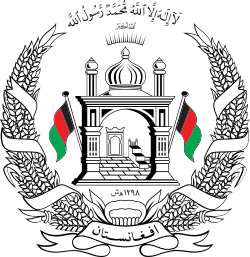Supreme Court of Afghanistan
The Supreme Court of Afghanistan or Stera Mahkama (Pashto: ستره محكمه) is the court of last resort in Afghanistan. It was created by the Constitution of Afghanistan, which was approved on January 4, 2004. Its creation was called for by the Bonn Agreement, which read in part:
- The judicial power of Afghanistan shall be independent and shall be vested in a Supreme Court of Afghanistan, and such other courts as may be established by the Interim Administration.
| Supreme Court of Afghanistan | |
|---|---|
| ستره محكمه | |
| Established | January 4, 2004 |
| Location | Great Massoud Road, Kabul |
| Authorized by | Constitution of Afghanistan |
| Judge term length | 10 |
| Number of positions | 9 |
| Website | http://supremecourt.gov.af/en |
| Chief Justice | |
| Currently | Sayed Yousuf Halim |
 |
|---|
| This article is part of a series on the politics and government of Afghanistan |
|
Government Executive
Legislature
Judiciary |
|
Administrative divisions
|
|
|
Currently, the nine-member court is made up of the following justices:
- Chief Justice Sayed Yousuf Halim[1]
The nine justices on the tribunal are appointed for 10-year terms by the President of Afghanistan, with the approval of the Wolesi Jirga, the lower house of the nation's legislature. The President selects one of the nine members to serve as Chief Justice. The constitution allows for judges to be trained in either civil or Islamic law. Matters of law with no provision in the constitution or other standing laws shall be judged by the Hanafi jurisprudence. The judiciary shall apply the Shia school of law in cases dealing with personal matters of those who are of the Shia sect, where applicable.
The Court was previously dominated by conservative religious figures and the former Chief Justice, Faisal Ahmad Shinwari, in particular was described as "ultra conservative." Several of its rulings disappointed reform-minded Afghans and people in the Western world. For instance:
- the court, during the 2004 presidential election campaign, sought to ban a candidate who questioned whether polygamy was in keeping with the spirit of Islam;
- they have called for an end to cable television service in the country, at least pending government regulation, due in part to the apparent influence of films from Bollywood, which were allegedly prurient;[2]
- the court upheld the death penalty for two journalists convicted of blasphemy for saying the Islam being practised in the country was reactionary;[3]
- they banned women from singing on television;[4][5] and
- they ruled that a girl, given as a bride when 9 years old and now 13, could not get a divorce from her abusive husband, notwithstanding a law that makes it illegal for girls under 16 to marry.[6]
- they ruled that the punishment for homosexuality is death, even through the penal code of 1976 stipulates long prison sentence for adultery and sodomy.[7]
In 2006, President Hamid Karzai appointed several new, more moderate members to the court. However, he also chose to renominate Faisal Ahmad Shinwari as Chief Justice. Despite controversy surrounding the validity of Shinwari's legal credentials, his nomination was allowed to continue, but ultimately failed when voted on in the National Assembly. Karzai then chose his legal counsel, Abdul Salam Azimi, to succeed Shinwari. Azimi's nomination passed, and the new court was sworn in on August 5, 2006.
Building
The Supreme Court is housed in a four storey office building on Great Massoud Road next to Massoud Square. On February 7, 2017, a suicide bomber killed 20 people outside the building.[8][9]
References
- "Archived copy". Archived from the original on 2015-10-03. Retrieved 2015-09-21.CS1 maint: archived copy as title (link)
- Afghanistan: Supreme Court bans cable TV Archived 2005-12-15 at the Wayback Machine 21 January 2003
- Supreme court confirms death sentence for two journalists for "blasphemy" Archived 2003-12-02 at the Wayback Machine 6 August 2003
- Afghan Supreme Court Upholds Media Ban on Women August 31, 2002
- Afghan TV U-turn on women singers 16 January 2004
- 415: Media Not Supported Archived 2008-10-28 at WebCite Arizona Daily Star
- Harsh Penalties Remain for Gays in Afghanistan Archived 2012-05-27 at Archive.today Washington Blade, April 19, 2002
- Bacon, John (February 7, 2017). "20 killed in blast outside Afghan Supreme Court". USA Today. Retrieved February 7, 2017.
- McKernan, Bethan (February 7, 2017). "At least 20 killed in blast outside Afghanistan's Supreme Court". The Independent. Retrieved February 7, 2017.